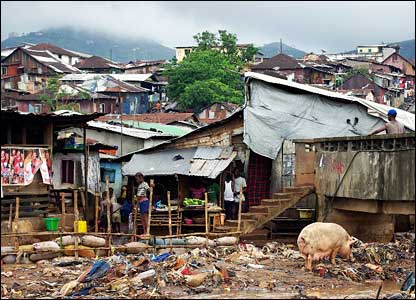A look at Sierra Leone’s Eco-tourism to fight the Cholera outbreak
Sierra Leone is a country surrounded with hills and mountains. Its unique coast line and riverbeds form parts of the country’s landscape that makes it attractive with buoyant eco-tourism potential. (A bustling wharf)
However, taking a closer look at the wharfs and bays around Freetown and its peninsula, it is disappointing and degrading to the point that the beauty they once represented has become a public eyesore.
Enough garbage is spotted around the various sites, and plastic polythene wastage of all forms is party to the mess around Freetown’s coastal zones.
This mix of rubbish, coupled the stench oozing of the fishing communities, where adults as well as children team up in defecating in the sprawling sea has become a scolding battle to defeat the giant. In addition to all the descriptions fitted to the various wharfs, a strong stench of decay, mixed with salt in the atmosphere makes the environment more dreadful and prone to outbreaks such as cholera, and diarrhea etc.
Considering the multiple uses the sea outlets are put into, the eye-souring condition is now considered a menace. Boats serving as sea route transportation often land in these wharfs as the nearest conduit to fast-track commercial activities.
King Jimmy, central one in the capital of Freetown, is one such market center used as a commercial hub servicing many people’s needs. In the 1960s, people used to throng King Jimmy on Tuesdays and Thursdays on shopping sprees.
A lot of foodstuffs; like dried-fish, cockles, sea-snails, vegetables, palm oil, cassava, rice and much more produce brought from places like Bonthe Island, Banana Island, Lungi, Pepel and several other coastal villages situated in the historic riverine Rokel communities, were sold at very affordable cost, but are now a thing of the past.
Today’s looks of the monumental King Jimmy Market is absurdly different. Filth is commonplace and the only recreational game is toying with pigs around.
Making the scene miserable, when these foodstuffs are offloaded from the boats (Pampa) to the ground, they are placed on top of the stinking garbage. These all prove leeway for the germination of communicable diseases, a medical science claimed, and are a recipe for the worse outbreaks in the present day generation.
The Moe-Wharf, Kroo-Bay, Magazine-Wharf, Oku-Wharf, Government Wharf, Mabayla Wharf, and Susans-Bay to name a few, are all seriously infested with plastic and domestic waste, which are responsible for the damaging effect of the environment, especially the sea that accommodates all the garbage coming from the hills.
It could be recalled that Health Inspectors used to visit every nook and cranny of the country to ensure that people’s sanitary conditions are improved upon.
Where are the dogcatchers, anyway? Are the Health Inspectors not healthy anymore? What is City Council doing? – are some of the questions already being asked. Today there are houses without toilet facilities; inhabitants in such places only have the black plastics to use as option for the lavatories.
Health sanitary officers, many have said, should get back to work and place red alert ribbons in certain areas declaring them defecation free zones. Quite besides this, the idea of beach wardens was introduced some time ago to help protect the safety and sanitary nature of these eco-tourism attractants to beat the odds off.
By E. Awotelli-Cole
Stay with Sierra Express Media, for your trusted place in news!
© 2012, https:. All rights reserved.






